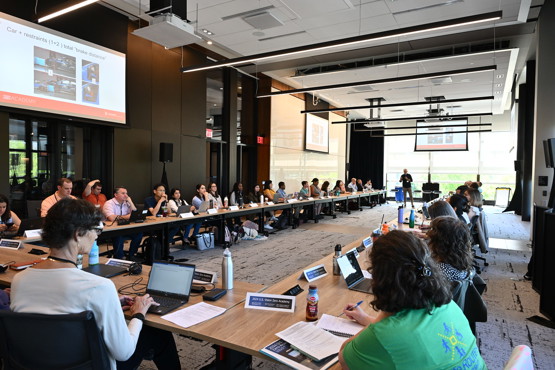US hosts first Vision Zero Academy

At the heart of both the Decade of Action for Road Safety 2021-2030 and the US National Road Safety Strategy, the safe systems approach has been gaining popularity. Countries using the safe systems approach have achieved both the lowest rates of fatalities on roads and largest reductions in fatalities over 20 years. Key to its successful implementation are increased understanding and capacity building around safe systems. With $5 billion in Safe Streets and Roads for All (SS4A) community grant funding, the US has an opportunity to learn from others which have implemented safe systems first. Taking a critical step in enabling the full benefits of this funding, and meeting national and international demand, Johns Hopkins University, the FIA Foundation, the Institute for Transportation Engineers, and the AAA Foundation for Traffic Safety hosted the first US Vision Zero Academy. The Academy is modelled after the annual training program conducted by the Swedish Transport Administration.
Lead instructors included four experts from the Swedish Transport Administration, as well as Johns Hopkins University professors Shannon Frattaroli, Director of the Center for Injury Research and Policy, and Jeff Michael, Distinguished Scholar at the Department of Health Policy and Management. They were joined by instructors across the global road safety field, including the World Health Organization, World Bank, and US Department of Transportation.

The FIA Foundation’s North America Director & United Nations Representative Natalie Draisin served as an instructor. She said, “As the world’s only large, high-income country where fatalities on roads have spiked in recent years, we have an obligation to save lives through what works – safe systems. With unprecedented funding via the Infrastructure bill, we have an opportunity to scale safe systems nationwide and also share lessons learned across borders. The Vision Zero Academy teaches us that implementing Vision Zero isn’t about paying lip service, it’s about challenging the status quo and using good data to make good policy.”
Held May 20-24, the Academy was attended by about 50 students from across the world, including federal staff from the US Department of Transportation and the National Transportation Safety Board. Representatives of US tribal communities engaged through Bella Dinh-Zarr, the FIA Foundation and Traffic Injury Research Foundation’s Senior Advisor for Public Health & Transportation, who presented their Action 2 Zero Toolkit to facilitate safe system adoption in underserved communities.
Jeff Michael said, “Equity is at the core of safe systems. It was central to our Safe Systems Consortium, led by Johns Hopkins, the Institute for Transportation Engineers, and the FIA Foundation, which influenced the Infrastructure Bill by outlining key actions for the Administration and Congress to take to change the course of road safety and work toward a more equitable transportation system. The Vision Zero Academy is a natural next step in investing in our ability to implement this life-saving approach.”




